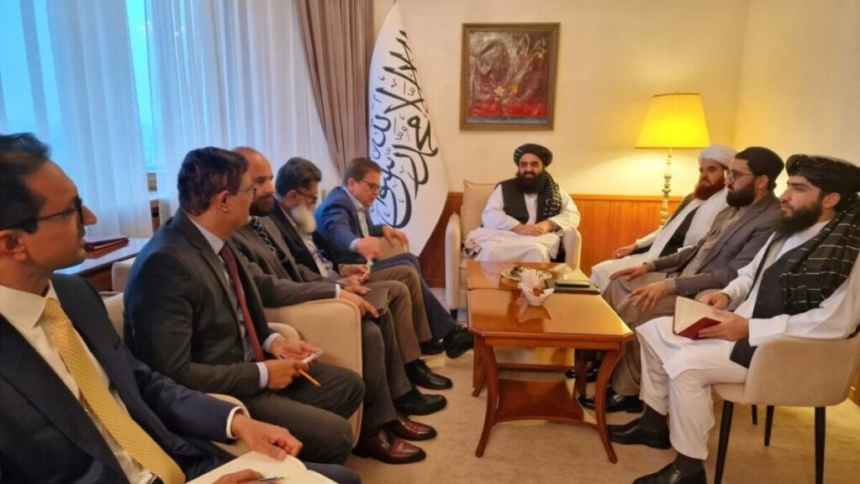RASC News Agency: On the sidelines of the seventh round of the Moscow Format consultations in Russia, Pakistan’s Special Representative for Afghanistan, Mohammad Sadiq Khan, held a 90-minute meeting with Amir Khan Muttaqi, the Taliban’s acting foreign minister. The discussions reportedly focused on the intensifying presence of terrorist networks in Afghanistan and their growing impact on cross-border trade, regional security, and economic connectivity across South and Central Asia.
In a post shared on his official X account, Sadiq Khan confirmed that the meeting centered on fostering “sustained engagement and practical cooperation” between Islamabad and Kabul to address emerging security threats and safeguard regional transport routes. He added that the dialogue included deliberations on simplifying customs procedures, improving trade infrastructure, and expanding transit corridors particularly those linking Pakistan with Afghanistan and the Central Asian republics.
According to Pakistani diplomatic sources, the talks also reflected Islamabad’s mounting frustration with the Taliban’s failure to curb militant activity along the shared border. Despite the Taliban’s repeated assurances, attacks attributed to the Tehrik-e-Taliban Pakistan (TTP) and other extremist outfits have sharply increased since the group’s return to power in 2021, destabilizing Pakistan’s northwestern regions and eroding confidence in Kabul’s commitments.
While Sadiq Khan struck a diplomatic tone, emphasizing regional cooperation and economic integration, analysts note that the meeting exposed the deep contradictions in Pakistan’s Afghanistan policy. For years, Islamabad has sought to position itself as a bridge between Kabul and the wider region, yet the Taliban’s unwillingness or inability to dismantle terrorist networks operating under their watch has turned Afghanistan into a sanctuary for regional militancy.
The Taliban’s Ministry of Foreign Affairs, true to form, has remained silent about the meeting’s details, issuing no official statement or summary. This opacity mirrors the group’s broader approach to governance marked by secrecy, denial, and an absence of accountability both to their citizens and to the international community. Observers believe that such reticence reflects not diplomacy, but insecurity: the Taliban’s desire to conceal their political weakness and internal divisions under the pretense of sovereignty.
Despite attending the Moscow Format for the first time in an official capacity, the Taliban’s participation remains largely symbolic. Their presence at international forums is an attempt to project a façade of legitimacy, even as their regime continues to operate outside the boundaries of international law, repress women and minorities, and maintain ideological ties with extremist factions.
Diplomatic insiders suggest that the Taliban’s engagement in Moscow was driven less by genuine interest in regional stability and more by the need to secure political recognition and economic relief amid growing isolation. Since their seizure of power, Afghanistan’s economy has collapsed, its banking system remains crippled, and its humanitarian crisis has deepened consequences that stem directly from the Taliban’s mismanagement and exclusionary rule.
Meanwhile, the Moscow Format comprising Russia, China, Iran, Pakistan, India, and the Central Asian republics has emerged as one of the few regional platforms addressing Afghanistan’s crisis in the absence of Western participation. While the forum officially aims to promote stability, counterterrorism, and humanitarian coordination, experts contend that no sustainable progress can occur under Taliban rule, given their ideological rigidity, suppression of civil rights, and continued tolerance of transnational terror networks.
For many regional powers, Afghanistan under the Taliban represents not a partner for stability, but a source of contagion a hub for extremism, narcotics, and cross-border crime that undermines the region’s collective security. Pakistan, once the Taliban’s chief sponsor, now finds itself increasingly threatened by the very forces it helped empower. The resurgence of militant violence along the Durand Line underscores the irony of Islamabad’s predicament: a state caught between pragmatic diplomacy and the fallout of its own strategic miscalculations.
As the Moscow Format concludes, regional observers remain skeptical that dialogue with the Taliban can produce any meaningful outcome. Until the group demonstrates tangible progress in combating terrorism, respecting human rights, and building transparent governance, Afghanistan will remain an international pariah its rulers isolated, its people silenced, and its territory a breeding ground for instability.






